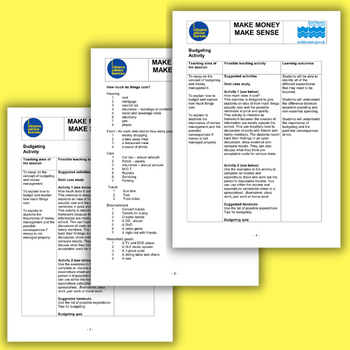Budgeting lesson plan and activity sheet PDFs, plus PowerPoint presentation
KS3
Years 7-9
The aim of this lesson is to explain the concept of budgeting and money management; how to budget and what it entails, and to identify all of the different potential living costs.
You’ll explain to students the importance of money management and the possible consequences if they do not manage their money properly.
Outcomes
Students will be able to identify all of the different expenditures they may face. They’ll understand the difference between essential spending and non-essential spending and the importance of budgeting, as well as the potential consequences of not.
Budgeting worksheets KS3
This resource includes:
- Lesson plan PDF
- Budgeting worksheets KS3
- PowerPoint presentation
Tips for budgeting
- Allow time to work out your income and expenditure each month.
- Use your bank statement to check all essential spending.
- Keep a record of your spending and review it once a month.
- Keep receipts wherever possible.
- Set up standing orders or direct debits for rent, telephone, utilities bills and other regular payments. This can help you budget and make sure you don’t forget to pay bills on time.
- Set aside an amount each month for savings if you can and include this in your expenditure calculation.
- Think ahead for any future expenses you can predict such as birthdays, Christmas and start of term. Plan your saving toward these dates.
- Be aware of your present financial situation – how much your current balance is and how much you owe. Avoiding the subject will only make it worse.
Make Money Make Sense has been developed by Eastbourne Citizens Advice Bureau and East Sussex Trading Standards. It provides teachers with all they need to teach the financial literacy aspects of the citizenship curriculum. Download a budgeting lesson for KS4.














